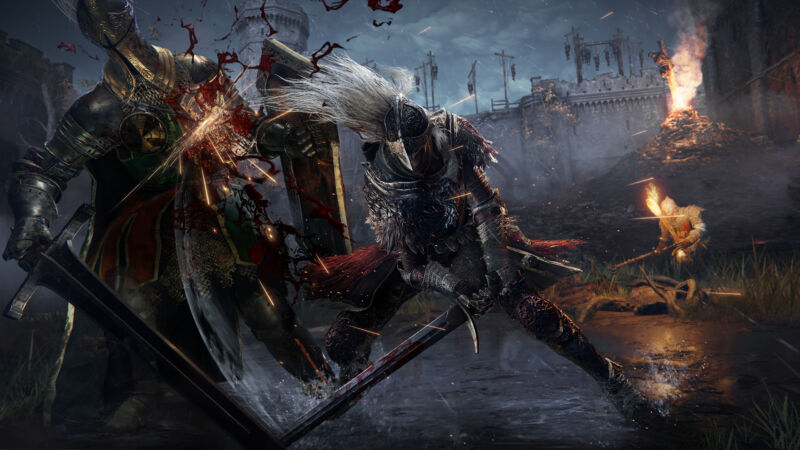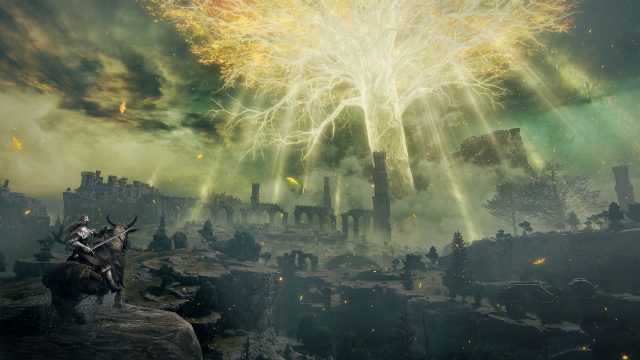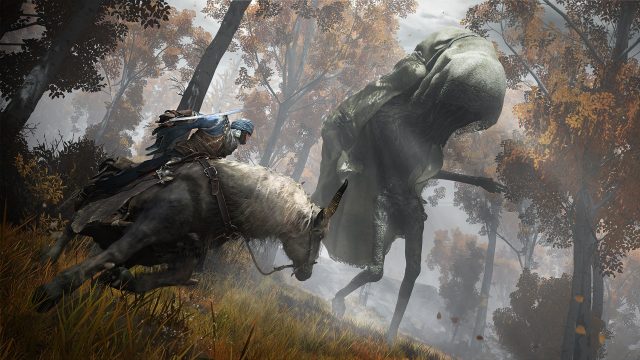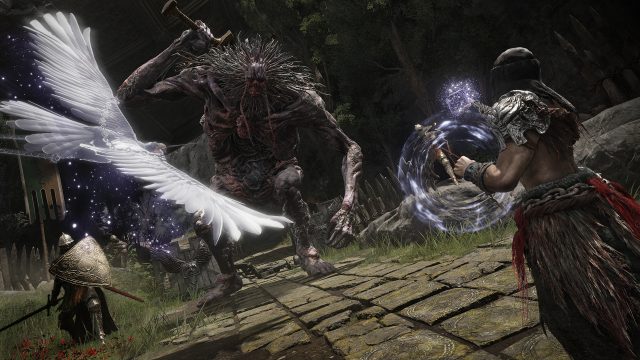
Every time FromSoftware releases a new title, the entire gaming community seems to get wrapped up in the same tired debates about game difficulty. One side complains that games like Dark Souls and Bloodborne are just too hard for their own good and that only masochists enjoy games that punish players for every little mistake. On the other side, die-hard FromSoftware fans will argue vehemently that the games aren't really that difficult if you just play them correctly.
The release and massive success of Elden Ring has predictably revived those debates, leading to familiar and circular arguments. To help end the bickering, we've tried to break down the vast and loaded concept of "difficulty" in video games into an Ars Difficulty Matrix (™) consisting of five noncomprehensive subcategories.
We've laid out the elements of that matrix below, and for each element, we've tried to explain how Elden Ring fits into the history of game design. In doing so, we hope to show that Elden Ring can be both brutally difficult and incredibly easy. It all depends on what, exactly, you mean by "difficulty."
Mechanical difficulty
Mechanical difficulty simply refers to the way games require players to hit a certain set of buttons in a certain timing window to complete the next objective. This form of difficulty is also sometimes referred to as a "reflex test."Mechanical difficulty has a very long history in gaming. Classic arcade games overwhelmingly relied on increasingly difficult reflex tests to weed out players and force them to put in another quarter. Early console games often did something similar, using demanding mechanical challenges to increase the playtime on cartridges with limited storage space. When people talk about games being "Nintendo Hard," they're usually talking about mechanical difficulty.
While pure mechanical difficulty isn't as popular in games as it once was, it still features prominently in platformers like Super Meat Boy, Celeste, or the so-called "Kaizo Mario" ROM hacks, to name just a few.

Compared to games like that, Elden Ring just isn't very mechanically difficult. Most enemies telegraph their attacks with massive, seconds-long animations that give players plenty of time to react with a well-timed dodge, block, or parry. Some of the game's platforming sections require precision double-jumps on a horse, but most of them are optional. While you can't just button-mash your way to victory in Elden Ring, you don't need preternatural hand-eye coordination to make progress either.
But while each individual block and attack may not be mechanically difficult, Elden Ring can require a lot of focus and endurance to chain moves together into a successful battle (or series of battles). That's especially true when multiple enemies gang up to attack you from all sides. So moves in Elden Ring are kind of like pushups; performing one is child's play, but performing 100 in a single chain can be torture.
Which brings us to...
Punishing difficulty
This side of the Ars Difficulty Matrix measures how much of a penalty you pay for failure to complete an objective. How many mistakes can you make before facing the words "game over"? And when you do get a "game over," how much progress do you lose?
In a title like Spelunky, a single mistake can mean restarting your entire run from the beginning. On the other end, Quantic Dream games like Heavy Rain or Detroit: Become Human don't have a "failure" state in the first place. They simply adapt the ongoing story to whatever you decide to do.
When people say Elden Ring and other FromSoftware games are difficult, the word those gamers are usually looking for is "unforgiving." FromSoftware makes games where one false move against even minor enemies can cost you a significant chunk of your health bar or even lead to instant death.
While Elden Ring is a bit more generous than its predecessors with the flasks that can refill your health bar away from a checkpoint, using those flasks requires pausing for a lengthy animation that can open you up to a merciless counterattack if you're not careful. And that doesn't even get into the situations where you simply roll off a ledge and tumble hilariously to your death.

Where Elden Ring is slightly less punishing than previous FromSoftware games is in the consequences for death. Checkpoints are relatively frequent, including just outside most boss fights. That means you don't lose much progress when you restart. And while you do drop all your valuable runes every time you die, it's usually not too hard to run back to the point where you fell and recover them. The main penalty for death is the few minutes you need to reload the last checkpoint and repeat your advance.
Arcane difficulty
How well does the game explain its inner workings? Are there detailed tutorials explaining the basic controls and deeper strategies? Or do you have to figure it all out on your own? Are there signposts showing you where to go next?
In other words, does the game hold your hand?
This is another area where Elden Ring tends to be more "difficult" than plenty of other modern games. Elden Ring is so unwilling to hold your hand that many gamers are unintentionally missing the introductory combat tutorial. And while many modern games make it nearly impossible to avoid the key items you need to progress, Elden Ring has spawned countless articles like "Elden Ring's Easiest Essential Items To Miss."
Any game that's happy to let you miss "essential" items is more than willing to let you fail in a way that many people will consider "difficult." Elden Ring also lets players make the game harder for themselves without much warning—melee-based characters seem to have a much more difficult experience than classes that can make use of magic, for instance, though the game itself won't warn you about this.
Meanwhile, there's a whole genre of YouTube videos explaining Elden Ring's "tricks and hidden mechanics." Many of these, like being able to swing a sword on either side of your horse, would have been explained in a less arcane game.

On the one hand, this kind of difficulty can be "solved" with a quick Google search or Wiki consultation. Sharing Elden Ring secrets like a kid on the schoolyard can even become part of the game's appeal—for the right kind of player. On the other hand, if you consider a video game a self-contained text, figuring out even basic gameplay elements in Elden Ring is perhaps more difficult than it should be.
But Elden Ring does have an in-game messaging system through which players can share tips and tricks with strangers across the Lands Between. Even still, that system is already so full of spam that it can be hard to rely on for useful information.
Grindable difficulty
Even the hardest mountain can be ground down by a gentle stream if given enough time. Similarly, some games that seem tough at first can eventually be completed if you're willing to put in the time to grind out improvements to your character's power level.
In a game like Super Meat Boy, there's no item you can find to make a difficult series of jumps any easier. In Elden Ring, on the other hand, the game can become significantly easier as you put in more time collecting the runes and items needed to power up your character level, weapons, and spells.
Some streamers have taken this quirk to its extreme, showing that even some of the game's most difficult bosses can be disposed of with a single magical attack if you put in enough effort grinding out levels. On the other end, some players have shown that the game doesn't require that kind of grinding by speedrunning through the final boss in less than three hours (and bringing to mind similarly wild Breath of the Wild runs). That's some good, flexible difficulty design right there.
But while grinding can make early game challenges seem remarkably easy, Elden Ring's extremely open design also means you can stumble into places that your character isn't yet equipped to handle. Players trained on more linear games (or even open-world games that guide players more gently) might expect that the most brutal parts of Elden Ring's map will be explicitly closed off until a certain level has been achieved or a certain item has been found. But that's just not the case in Elden Ring, where you're often better off noting the existence of a challenging area and coming back later when you've leveled up a bit.

But just because players can eventually grind out progress in Elden Ring doesn't mean the game is not "difficult." Spending hours farming low-level enemies for the runes and items needed to power up might not be "hard," per se. Still, it's not exactly satisfying when you feel like you need to spend extra time grinding out an "artificial" power boost to complete an in-game challenge. And while there are tricks to speed up the usual leveling grind, most won't be immediately apparent to gamers who don't consult outside help (see "Arcane difficulty" above).
Difficulty walls
If you run into a seemingly insurmountable in-game obstacle, is there another way around it? Early console games were full of impassable walls that fully impeded a player's progress. If you couldn't beat the boss of level 2 in Ninja Gaiden, for instance, you weren't allowed to even see level 3.
Instead of walls like these, Elden Ring is more defined by in-game bollards. These extremely hard challenges can and do block access to portions of the game. But in Elden Ring, if you can't break through a bollard (e.g., a major boss), careful exploration can almost always reveal a way to get around the obstruction and discover further interesting things on the almost never-ending map.

Elden Ring's use of bollards rather than walls is one of its best design features. Rather than needing to bang your head against a difficult boss or enemy-filled clearing for hours, Elden Ring makes it easy to simply bounce off and go in a different direction. Thanks to your horse, you can even gallop deep into some of the hardest sections of the game very early on, avoiding enemies wholesale as you farm new items and reveal new portions of the map. Then, once you're more powerful, you can come back and take out the bollard that had been giving you so much trouble (see "Grindable difficulty" above).
In a way, this design doesn't lessen Elden Ring's overall difficulty—you'll still need to beat all those "impassable" challenges eventually if you want to complete the game. But this design makes that difficulty much less frustrating. Gamers can always feel there's something new they can explore or do right now.
What do you mean by “difficulty”?
So is Elden Ring really that difficult? Yes and no. The game isn't especially taxing on the reflexes, and it doesn't have many challenges that you can't defeat through dedicated grinding. It also doesn't have many frustrating walls that impede all progress until you can break through. But Elden Ring is also a game that can severely punish even a small break in focus. And it's willing to let you fail because you missed some "essential" element that wasn't explained very well in the game itself.
Different players will have different reactions to each of those types of difficulty. For some players, slowly unraveling the endless mysteries of Elden Ring by talking with others is a huge part of the charm. For others, missing a key item or mechanic that the game didn't explain leads to hair-pulling frustration. For others still, having the option to speedrun through the game quickly is a way of creating your own ultrahard challenge.
The fact that Elden Ring can be so many things to so many different gamers is a large part of its frustrating and entrancing appeal. Or, to put it another way, Elden Ring can be as hard or as easy as you want it to be.
March 09, 2022 at 07:30PM
https://arstechnica.com/gaming/2022/03/is-elden-ring-really-that-hard-well-it-depends-what-you-mean-by-hard/
Is Elden Ring really that hard? Well, it depends what you mean by “hard” - Ars Technica
https://news.google.com/search?q=hard&hl=en-US&gl=US&ceid=US:en
No comments:
Post a Comment